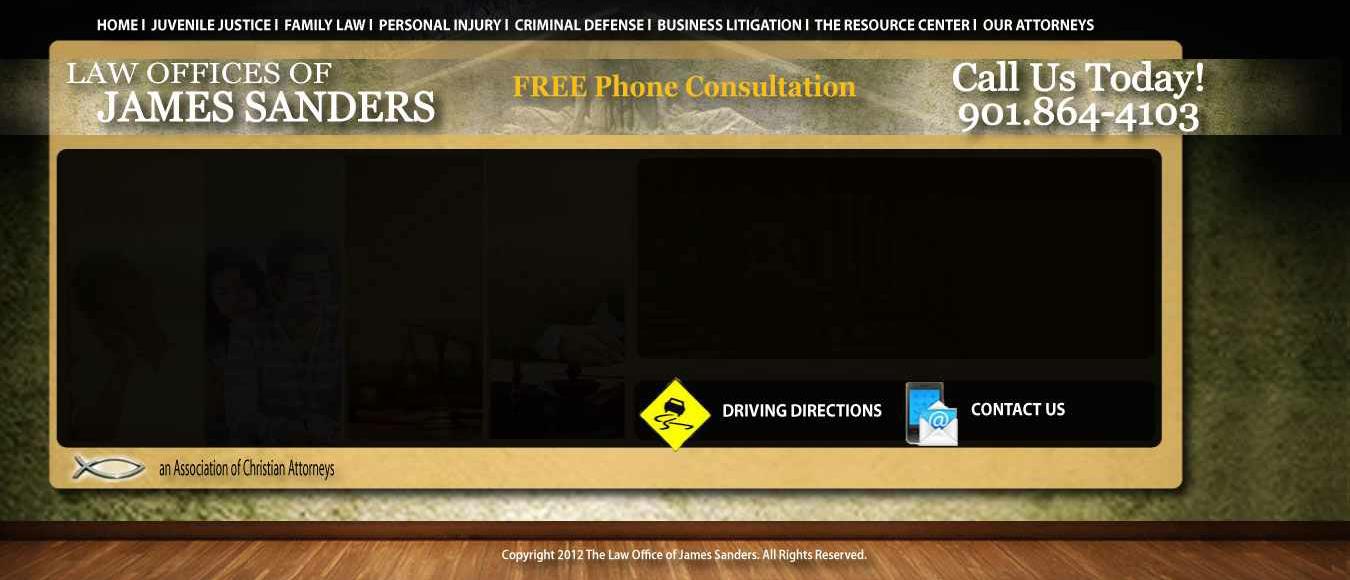
site designed by Fresh Concepts Web
Juvenile Justice

Over the past 12 years, attorney James Sanders, the managing attorney for the Law Offices of James Sanders, has personally represented more than 8,000 juvenile court clients in cases involving every aspect of Juvenile Justice, including delinquency cases, child visitation cases, child custody and guardianship cases, grandparents visitation cases, actions for restraining orders, dependency and neglect action, paternity actions, termination of parental rights cases, establishment and encroachment of trust accounts, child support prosecution and defense, prosecution and defense of civil and criminal contempt actions, and truancy and educational neglect cases. Attorney Sanders is highly respected among juvenile justice practitioners and his advice is frequently sought by his peers in matters involving juvenile justice and family law practice. Under his leadership, The Law Offices of James Sanders is available to assist you with your cases involving:
• Juvenile delinquency cases
Juvenile delinquency cases
• child visitation cases
child visitation cases
• child custody and guardianship cases
child custody and guardianship cases
• grandparents visitation cases
grandparents visitation cases
• actions for restraining orders
actions for restraining orders
• dependency and neglect actions
dependency and neglect actions
• paternity actions
paternity actions
• termination of parental rights cases
termination of parental rights cases
• establishment and encroachment of trust accounts
establishment and encroachment of trust accounts
• child support prosecution and defense
child support prosecution and defense
• prosecution and defense of civil and criminal contempt actions and
prosecution and defense of civil and criminal contempt actions and
• truancy and educational neglect cases
truancy and educational neglect cases
Our legal team has a proven and unmatched record of success in the practice are of juvenile justice. Let us put our experience and resources to work for you. Don’t gamble when it comes to your children. The stakes are too high. Your family deserves the best representation. Call us today and put The Law Offices of James Sanders to work for you
THE HISTORY OF AMERICAN JUVENILE JUSTICE
In 18th century America, no real distinction was made in the criminal culpability of children versus adults. Juveniles as young as age seven could be tried and sentenced in criminal courts. In 1825, The New York House of Refuge was founded as the first institution designed to accommodate juvenile delinquents. Many cities and states soon followed this example and set up similar institutions.
The first juvenile court in Cook County, Illinois was founded in 1899. The juvenile court was designed to tailor to a juvenile's individual needs, with the ultimate goal of rehabilitation. The process was subject to strict confidentiality in order to avoid any unnecessary stigmatization of minors. Because its goal of rehabilitation was not considered to be punitive, the court had no due process protections, and had jurisdiction over both criminal offenses and offenses which applied only to minors including offenses such as vagrancy and truancy. Judges played a paternal role, and were afforded tremendous discretion in order to achieve the goal of individualized rehabilitative justice. By 1925, 48 states had established a juvenile court system.
During the 1960s, advocates argued that juveniles should also be accorded the due process protections afforded to adults in court and they challenged the broad discretion given to juvenile court judges. During the 1960s and 1970s, The U.S. Supreme Court agreed that juveniles must be afforded due process protections including: formal hearings when facing waiver to criminal court; protection against self-incrimination; the rights to notice of charges, counsel, and cross-examination of witnesses; and adherence to the "proof beyond a reasonable doubt" judicial standard.
In 1974, Congress passed the Juvenile Justice and Delinquency Prevention Act, which still governs the juvenile justice system today and a 1980 amendment mandated that juveniles could not be placed in adult jails, with a few exceptions. In the mid-1970s, as the media began to highlight rising violent crime rates, the American public demanded a "get tough" approach to crime still widely endorsed today and almost every state passed laws making it easier to try juveniles in adult criminal courts
Suggestions On How You Can Help Your Child Succeed:
• Listen to your child.
Listen to your child. 




• Be consistent with your child.
Be consistent with your child. 



• Do not physically or verbally abuse your child.
Do not physically or verbally abuse your child. 

• Express love and affection.
Express love and affection.



• Create a stable family environment.
Create a stable family environment. 


• Agree upon and follow house rules.
Agree upon and follow house rules.
• Discuss problems.
Discuss problems.
• Meet your child's friends and their parents.
Meet your child's friends and their parents.
• Get involved in your child's school.
Get involved in your child's school.
• Set a good example yourself. .
Set a good example yourself. .
• Spend time with your child.
Spend time with your child.
• Reward positive behaviors.
Reward positive behaviors.
• Address your personal problems.
Address your personal problems.
• Get professional help you need.
Get professional help you need.
JUVENILE JUSTICE SYSTEM
The Juvenile Court system is based on the premise that youth are developmentally different from adults and that their behavior is correctable. Rehabilitation and treatment is the primary and goal.
Limitations are placed on public access to juvenile records to avoid their unnecessary stigmatization. Court proceedings may be confidential to protect privacy.
The juvenile justice system follows a psychological casework approach, taking into account the youth's history in order to meet his or her specific needs. The juvenile offender faces a hearing, rather than a trial, which incorporates his social history.
Law enforcement can detain a youth for his own protection or the community's protection.
Tennessee does not afford juveniles the right to a jury trial.
A juvenile offender is judged "delinquent" rather than "guilty." sentencing varies and may cover a wide range of options. The disposition is based on the individual's offense history, the severity of the offense, and includes a significant rehabilitation component. Disposition may also include restitution that can be directed at people other than the offender, for example his parents.
Probation combines surveillance with activities to reintegrate the juvenile into the community.
CRIMINAL JUSTICE SYSTEM
Operates under the assumption that criminal sanctions should be proportional to the offense. Punishment and Deterrence are the goals.
Open public access to criminal records is required, and all court proceedings are open to the public.
Defendants in the criminal justice system are put on trial, based largely on legal facts.
Defendants have the right to apply for bond or bail.
All defendants have a constitutional right to a jury trial.
A defendant is found "innocent" or "guilty." The offender is sentenced to a specified period of time which is determined by the severity of the offense, as well as the defendant's criminal history.
VS.
NEED CONSULTATION